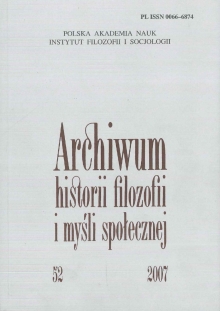Dwie doktryny cywilizacyjne. Koneczny a Majewski
Two Civilisational Doctrines. Koneczny and Majewski
Author(s): Robert PiotrowskiSubject(s): Psychology, Social Philosophy, Recent History (1900 till today), 19th Century
Published by: Instytut Filozofii i Socjologii Polskiej Akademii Nauk
Keywords: Koneczny; Majewski; cywilizacja;
Summary/Abstract: Two civilizational doctrines developed by Polish scholars are discussed and analytically compared: the one by Feliks Koneczny (1862–1949) and the other by Erazm Majewski (1858–1922). Some logical aspects of both are worked out. The doctrines in question have some points in common. The main are: a strong conviction that a solution of the problem of civilisation is crucial to understanding of history and society, and the basic definition of civilisation formulated as „form of social life” (Majewski) „the method of social life” (Koneczny). Moreover, Majewski directly influenced Koneczny by his four-volume Science of civilisation (published 1908–1923, French translation of vol. I appeared in 1908). The best known book of Koneczny is On the Plurality of Civilisations (1935, English translation 1962). Koneczny’s doctrine is purely structural, emphasising the fundamental split between nature and spirit. It contains a sophisticated system of cultural taxonomy called „comparative science of civilisations”. Civilisations are effectively defined as systems of highest values and norms. At the same time they can be viewed as abstract equivalence classes between cultures. Majewski attempted at an evolutionary schema, and viewed civilisation as the highest stage of the universal progress. Civilisations are viewed as relatively closed systems of social interactions, being primarily connected by common language. Both doctrines lead to fundamental questions concerning relations between biology, sociology and history, and still seem interesting.
Journal: Archiwum Historii Filozofii i Myśli Społecznej
- Issue Year: 52/2007
- Issue No: 52
- Page Range: 217-230
- Page Count: 14
- Language: Polish

